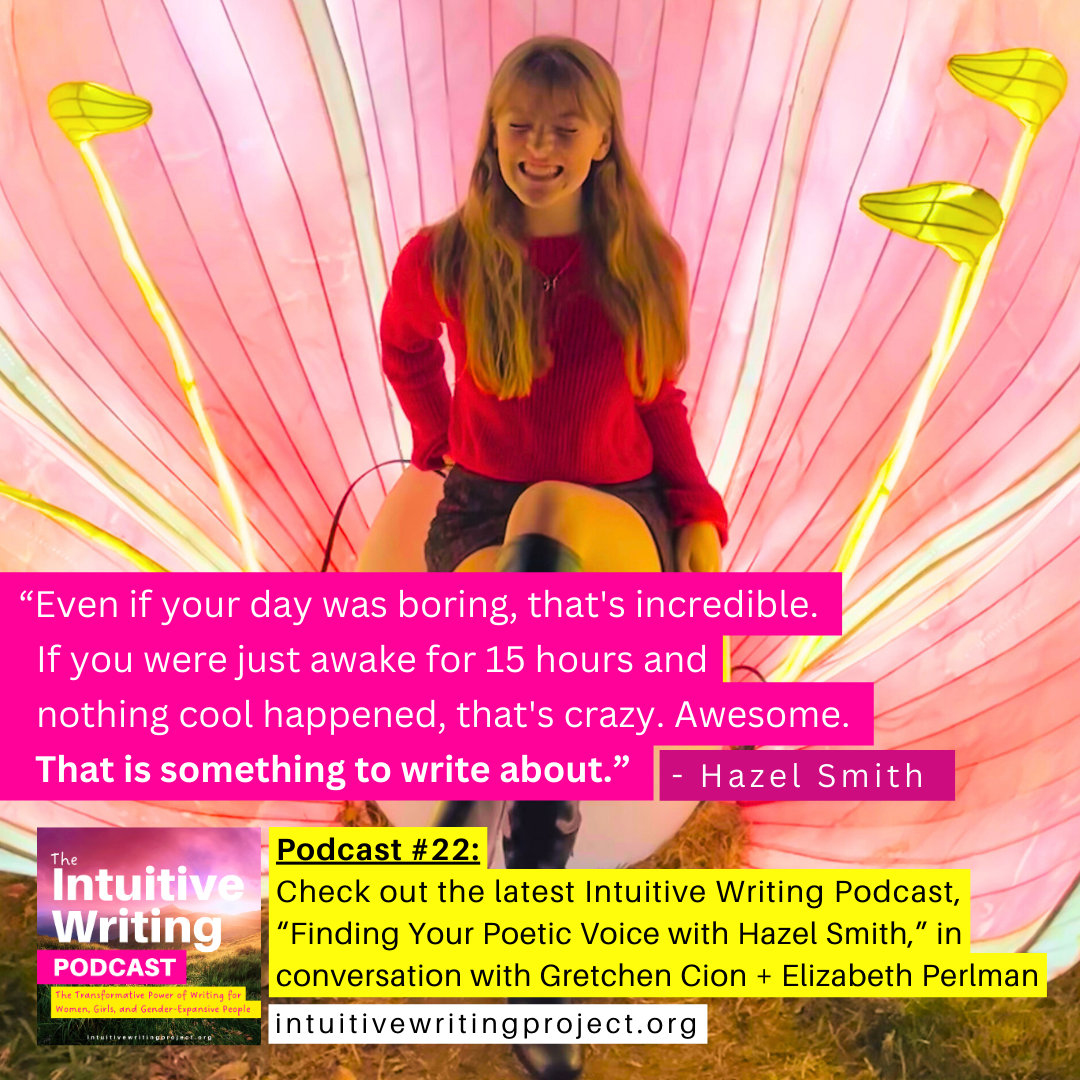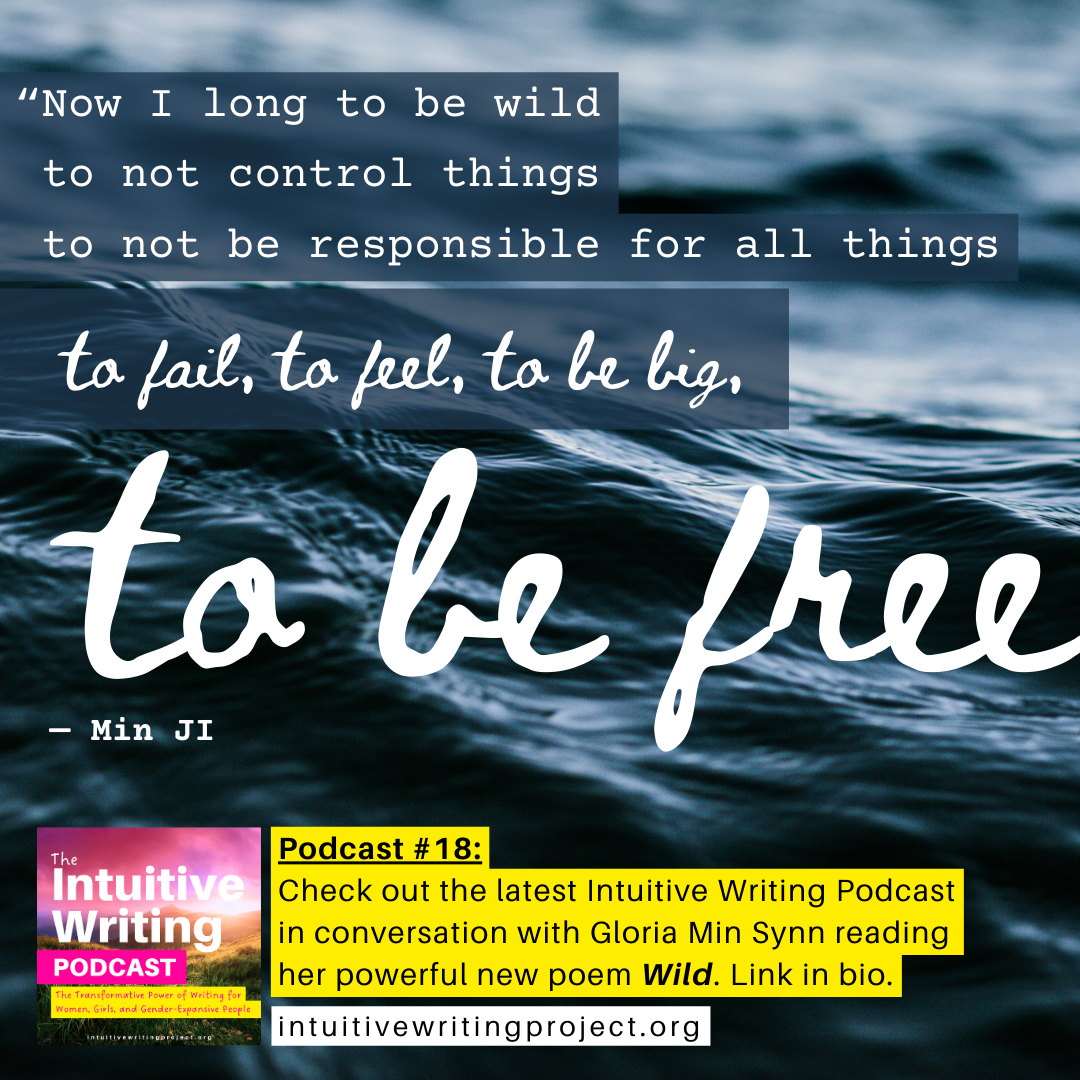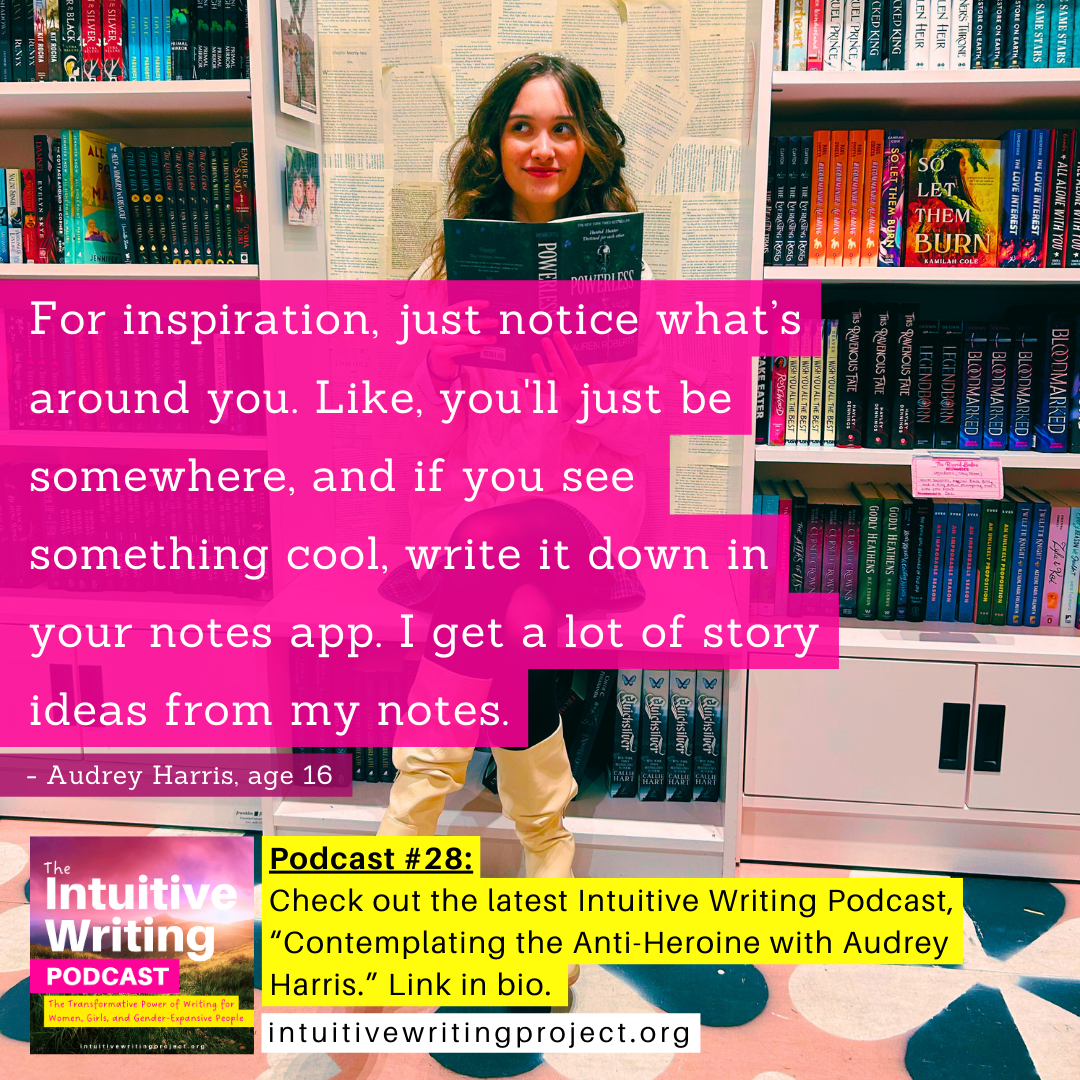Episode Transcript
[00:00:00] Elizabeth: Hello and welcome to the Intuitive Writing Podcast, a production of the Intuitive Writing Project, a writing-based empowerment program for girls and gender-expansive youth. We are dedicated to giving young writers a safe, encouraging, non-critical, unconditionally supportive space to write their story, speak their truth, and assert their voice, both as writers and as leaders.
For a bit of background, my name is Elizabeth and I created this program eleven years ago because it's what I wanted and needed when I was young, a supportive place to be truly seen and heard. That's why we use the Amherst Writing method, a radically nurturing and empowering writing methodology, I wish everyone learned in grade school. You can read more about the Amherst Method on their website and in Pat Schneider's groundbreaking book, Writing Alone and With Others. But the basic principles and the ones that guide all of our classes are number one: everyone is a writer with important stories to tell. Number two: everyone has their own unique voice, a voice that needs to be heard. And number three: our voice will grow stronger and clearer the more it is supported and positively affirmed.
In our classes, everyone writes together, everyone shares their writing, and then everyone takes turns giving each other grounded, positive feedback. By that I mean we repeat back and lift up the words, lines, phrases, or concepts that really resonated for us since we can't violate the sanctity of our classes by recording what goes on there. These 1:1 or 1:3 people conversations are designed to provide a little glimpse, a microcosm of what happens in the classroom. You can also read about our and read our students words as they were published on our blog, the Intuitive Voice, with the link below.
If you enjoy listening to one young reader, read their words and talk about it. Imagine how powerful it is when six young writers are reading their words and giving each other positive, affirming feedback. It's pretty life changing, and there is a lot more I could say about it, but I'll let these young writers speak for themselves.
On behalf of all the writers at the Intuitive Writing Project, I want to thank you for supporting their voices, for being present and really listening to the wisdom, insight, and brilliance of young people.
[00:02:42] Elizabeth: Today I'm so delighted and honored to be interviewing another one of our brilliant writing students, the young Oriana who is going to be reading an incredible piece of writing before we get started. I'd love to have her introduce herself so y'all can get to know her. Oriana, if you tell us your full name, your pronouns, your age and your can you tell us your first experience of having writing be fun?
[00:03:16] Oriana: Yeah, sure, so, hi, my name is Oriana Deng. My pronouns are she, her, and I'm 15 years old.
The first experience I had with writing being fun was probably when I joined this class, mainly because Elizabeth does a great job of just kind of making writing fun and just making it less about the technical stuff and more about, like, the prompt and what you're going to write. And I really enjoy just, like, writing about my life and writing about whatever I want without having any strict rules. And I have to say, like, before this class, writing wasn't super fun for me, mainly because everybody, like, especially in my English classes, the teachers usually, like, had very strict rules, like, oh, you have to follow the structure of, like, topic sentence, like, details, and, like, conclusion. And I thought it was, like, very, like, a rigid. A very rigid way of writing, and I didn't really enjoy that. But this writing class has definitely gave. Me a lot of freedom to write whatever I want. And that's why this is one of the first times that I've actually enjoyed writing.
[00:04:25] Elizabeth: That's, like, the best testimonial ever! And I just want to tell the audience, I did not tell her to say this. This just happens to be a really great PR for us, but it's authentic. Thank you for saying that. I so appreciate it. And honestly, you've heard me say this before. The reason I created this program is because it's what I wanted when I was in high school, and I had the same problem. I have a really hard time writing essays. I still. Oh, my God. I don't even your essay. The rules for essays now are even more rigid, and it's almost like math. So y'all are doing great, and I'm so glad that you enjoy a less structured way of writing, which I also enjoy. I am with you on that. So if you would read… the piece is called “Joy doesn't Care.” This comes from a poem called “Joy Chose You” by Donna Ashworth, in which one of the lines was, “joy doesn't care.” But this writer, Oriana, took it to a whole other level, and I can't wait for y'all to hear it.
[00:05:33] Oriana: Joy doesn’t care if you’re sad, hungry, tired, or ugly. She’s like a small explosive at the back of your head, that you sometimes forget about but when the time is right she bursts, leaving you wondering how long the high will last before you crash again. For some people, joy is like an elephant, taking up half of your brain because their lives are abundant. For others, she’s like a drop of water on the hot concrete that has already started drying up. But she doesn’t care. Joy never cares about how much space she occupies in someone’s mind because she knows how much people want her. They look for her in every smile, in every monthly paycheck, and even in drugs. Sure, maybe they find her for a minute, maybe even for an hour, but she always leaves. They chase after her and beg her to stay, just a little longer, but she doesn’t listen. She never does. She just doesn’t care. It’s the people who understand joy that feel her the most. They understand that yes, she comes but she will leave twice as fast. They understand that yes, she is worth waiting for, but waiting will not make her come. It’s easy to forget her entirely, to forget the way she used to dance in every fold of your brain. After all, she hasn’t paid you a visit in so long, and you wonder if she will even come back at all. Some people stop waiting. Why should they keep waiting? Joy, you made people think you were coming back, but you never did.
[00:06:53] Elizabeth: It's so good. First of all, I love how the writer personified joy as a person. And of course, it's a she. So it feels that just adds to sort of this goddess, powerful goddess, female entity that this writer is describing. Very mysterious, very powerful, lives on her terms. She's kind of a badass. And there were so many great lines within this. Okay, I'm just gonna say a couple because really, I love every line. I love the line. She's like a small explosive at the back of your head that you sometimes forget about. But when the time is right, she bursts, leaving you wondering how long the high will last before you crash again. That is such an interesting and powerful way to describe that high. Very momentary experience of joy that we have that it's like an explosive at the back of the head. Also, back of the head is interesting biologically because that. That's the oldest part of our brain, where we tend to feel the most raw emotions. So it's like, I don't know if the writer knew this or intended this.
[00:08:08] Oriana: But no, like, it was actually supposed because, like, some people say, like, things that are, like, at the back of your mind are easy to forget about. So, like, that's where it was coming from.
[00:08:19] Elizabeth: That's interesting. Okay, that's brilliant. I love it. I love it. Great. Perfect. I mean, what's cool about this kind of writing, again, is that it is what we call intuitive writing, which means it comes from, like, the Wholeness of who you are versus just the brain. Like, it's like tapping into memories and experiences. And it sort of in your intuition, takes everything you've experienced it and synthesizes it into words, ideas, insights, which pops out as a story. So everything in here has layers of meaning that, like, we could analyze this piece for an hour, but we're not. We'll keep it short.
So I also love the line about joy is like an elephant taking up half of your brain because their lives are abundant. And then by contrast, for others, this line, when I first heard it, I was like, oh, my God, this is amazing. For others, she's like a drop of water on the hot concrete that has already started drying up. That almost makes me want to cry because it's that, like, oh, there's joy. It's gone. And I know that feeling. I know who it feels to feel this. Sorry, what were you going to say?
[00:09:37] Oriana: No, I was just agreeing.
[00:09:40] Elizabeth: I feel like you, the writer, were really... connecting to something deep in the way that they were describing this. Also, it's the hardest thing in the world is to find a metaphor which this piece is filled with metaphors that captures a feeling because, like, what is sadness? Sadness by itself is hard to describe, but this, like a drop of water on hot concrete that has already started drying up. Boy, that captures so many feelings. Sadness, despair, hopelessness, discouragement. There's so much in just that one metaphor. I love the repetition of she doesn't care. I love the description of how some people are looking for her everywhere and the desperation. And then. Yet she is this self-contained force of nature and she comes on her own terms.
And that last line, some people stop waiting. Why should they keep waiting? Joy, you made people think you were coming back, but you never did. Oh, that's so heartbreaking and relatable and powerful.
Is there anything else you would like to say about, like, how you were maybe how it felt when you finished reading it? Like, how did it feel for you to actually get it out on the page?
[00:11:14] Oriana: It felt pretty, like, good because it was kind of in a, like, my perspective of joy and like how I kind of view the concept of it. And it kind of represented how, like, I felt the past couple of weeks when, like, my happiness kind of like faded in and out, you know?
[00:11:38] Elizabeth: Evaporated very quickly like a drop of water. You captured it perfectly. It's so beautiful and very eloquent and honestly, it. I know it's a narrative, but it could be a poem because that's how beautiful it is. So I wanted you to give us advice because I know you've dealt with the same thing I've dealt with, the same thing all writers deal with, which is that sometimes, like, you just don't have an idea. You get stuck. And then other times, you. The ideas come. So based on your experience of, like, this time, boy, you had an amazing idea, and it just flowed out of you. What advice do you give yourself based on what you've learned and what would you give? Tell other people about what to do when you're stuck.
[00:12:29] Oriana: When you're stuck, I feel like all you have to do is just think about. Like, think about maybe how you were feeling and, like, either write about your feelings or I feel like writing about your feelings and, like, what's going on in. Your life is a perfect way to, like, start. Because there's always something to write about in your own life. Like, there's a lot of emotions that you go through on a daily basis. And it's hard to keep it all bottled up inside. So it's, like, pretty easy, in a sense, to, like, release all that into writing. So I feel like that's one thing to do when you're feeling stuck about writing.
[00:13:08] Elizabeth: That is the best advice. I think that's great. It's actually. They always say that when you're trying to meditate, like, come into the present moment. And I feel like that's what you're talking about. And that's what happens when you just write about what's happening to you in the present moment. What am I feeling? What was I just feeling? What's going on inside of me? You always have stuff going on. Everybody has stuff going on inside of them, but we don't often pay attention to it. So it's like, when you write, then you know what's happening in there, and there's. It's always interesting. Boy, it's so much more interesting than we think it is. Okay, and that brings me to our last question. I wanted to ask you. What do you feel like is. Because you mentioned writing about your feelings, expressing whatever is going on in your life. What do you think is the. The benefit of writing that most people don't realize? Because most people think writing is just, like, literary or it's just you write to write. What's the other benefit, beyond increasing your writing skills of this? Yeah.
[00:14:08] Oriana: Name, like, a single benefit. So I'm just gonna, like, describe stuff. Describe, like, an, like, what happens, I guess. So a lot of people, like, don't realize that, like, they have the ability to, like, write whatever they want and, like, share it. And I feel like that's why they're looking at writing in, like, a negative way. And I kind of blame it on school because it's like, oh, you write this. And people kind of get sick of writing. But, like, most people forget that it is a power that you have to be able to write and to be able to communicate your thoughts effectively, like, on paper, like, typing it out and having your ideas, like, shared.
Like, you know, in the olden days, like 100 years ago, like, well, like, especially women, like, didn't have freedom to, like, write and like, even, like, depending on what class you were in, what social class you were in, you weren't allowed to write either. Or you were just, like, illiterate. But, like, nowadays, writing is more like more people have the ability to. Which is why some people, like, kind of forget, like, what a power is. And yeah, it's like a privilege, really.
[00:15:26] Elizabeth: That is beautiful. That is so well said. So that's it. Thank you so much for your time. You are a delight, Oriana. You are such an incredible writer and just a super cool person.
[00:15:40] Oriana: Yay.
[00:15:42] Elizabeth: Thank you.


